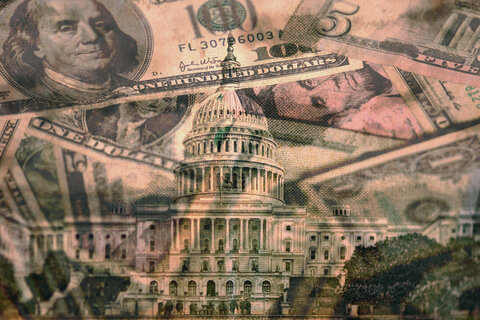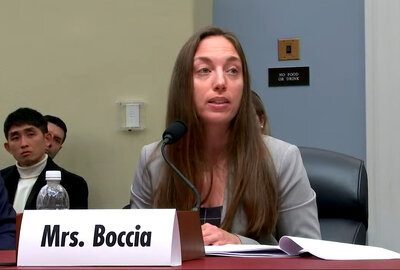
If elected to a second term as president, Donald Trump says he will impose a 60 percent tariff on all goods from China and a 10 percent tariff on all goods from other countries. He calls it a “ring around the country.” He should call it a ring around consumers because the tariffs will raise prices, limit choices, harm productivity, and act as a tax on importing businesses too.
These protectionist effects are undeniable, according to many experts, and their destructiveness is nothing new. More than 170 years ago, for instance, the free trade economist and French National Assembly member Frederic Bastiat (1801–1850) explained the folly of tariffs. He noted especially that “the restraint of trade” limits supply, making certain products scarce, which “raises prices.”
“Prices rise when and because things are scarce,” said Bastiat. In recent times, think of the baby formula scarcity and its higher price. Or recall that President Trump’s tariff on imported washing machines raised prices on washers foreign and domestic. Why on the latter? Because the tariff reduces competition on domestic producers.
That economic axiom was true in the 19th century and it is true today.
Trump’s tariff plan is “economically ignorant, geopolitically dangerous, and politically misguided,” says Scott Lincicome, head of Cato’s Herbert A. Stiefel Center for Trade Policy Studies. He adds that Paul Winfree, Trump’s Domestic Policy Council deputy in 2017, has denounced the tariff proposal, saying it “would impose a massive tax on the folks who it intends to help.”
According to the Peterson Institute for International Economics, the Trump tariffs “would reduce after-tax incomes by about 3.5 percent for those in the bottom half of the income distribution,” and “would cost a typical household in the middle of the income distribution at least $1,700 in increased taxes each year.”
The Center for American Progress reports that Trump’s tariffs “would amount to a roughly $1,500 annual tax increase for the typical household, including a $90 tax increase on food, a $90 tax increase on prescription drugs, and a $120 tax increase on oil and petroleum products.” .
Erica York, senior economist at the Tax Foundation, says Trump’s 10 percent tariff ring “would amount to a $300 billion annual tax hike, reducing the size of the US economy by 0.7 percent and eliminating 505,000 jobs.” That’s before we even consider foreign retaliation.
“We know from decades of experience and evidence that tariffs reduce employment, productivity, and output,” says York. “The past five years have demonstrated that reality all too well. During his term, Trump imposed nearly $80 billion of tariffs on steel, aluminum, solar panels, washing machines, and thousands of products from China. President Biden has largely maintained them. The result? They have destroyed US manufacturing jobs, harmed US farmers, raised prices for US consumers, and alienated our allies ….”
So, while both Trump and Biden claim to be protecting America from “unfair” foreign trade, they are effectively hurting US consumers and workers. This is what protectionism always does, as Bastiat explained so well.
For instance, in one of his most famous essays, “The Candlemakers’ Petition,” Bastiat reveals the absurdity of trying to protect domestic manufacturers from low-priced foreign competition.
The satirical petition of 1845 is addressed to the “Honorable Members of the Chamber of Deputies” from the “Manufacturers of Candles, Tapers, Lanterns, Candlesticks, Street Lamps, Snuffers, and Extinguishers, and from the Producers of Tallow, Oil, Resin, Alcohol, and Generally of Everything Connected with Lighting.”
The petition explains, “We are suffering from the ruinous competition of a rival who apparently works under conditions so far superior to our own for the production of light that he is flooding the domestic market with it at an incredibly low price; for the moment he appears, our sales cease, all the consumers turn to him …. This rival, which is none other than the sun, is waging war on us so mercilessly we suspect he is being stirred up against us by perfidious Albion ….
“We ask you to be so good as to pass a law requiring the closing of all windows, dormers, skylights, inside and outside shutters, curtains, casements, bull’s-eyes, deadlights, and blinds — in short, all openings, holes, chinks, and fissures through which the light of the sun is wont to enter houses, to the detriment of the fair industries with which, we are proud to say, we have endowed the country, a country that cannot, without betraying ingratitude, abandon us today to so unequal a combat.”
Blocking the sunlight, the petitioners claim, will boost production of candles and all the industries related to candlemaking and increase employment in those industries. “[W]hat industry in France will not ultimately be encouraged?” write the petitioners.
Consumers who lose the free sunlight and pay more for candles, do not matter, explain the petitioners, because the lawmakers’ stated goal is “to encourage industry and to increase employment.” Block the sun and you’ll create jobs! But, of course, demand will go up for artificial light, and prices will rise, hurting both end customers and industry reliant on that input.
Bastiat’s argument is universally applicable. Tariffs on foreign goods—whether 10% or 100%— always hurt consumers, whether households or businesses. Even if you tax a foreign good that is so low priced—it’s free!—consumers will pay the cost. It’s a bad deal all around.
Bastiat ends the petition, “Make your choice, but be logical; for as long as you ban, as you do, foreign coal, iron, wheat, and textiles, in proportion as their price approaches zero, how inconsistent it would be to admit the light of the sun, whose price is zero all day long!”
Trump, Biden, and the entire Congress could learn from “The Candlemakers’ Petition.” The best trade policy is free trade.










